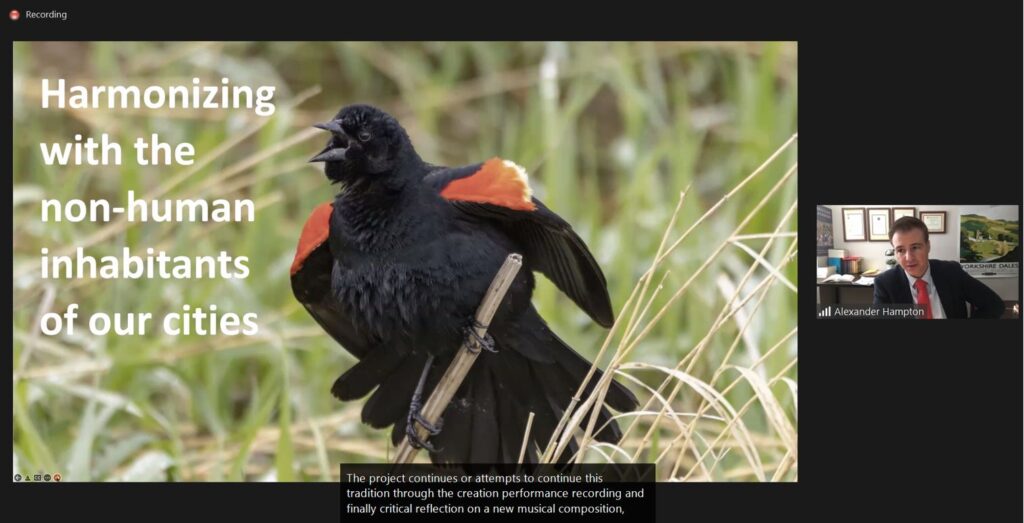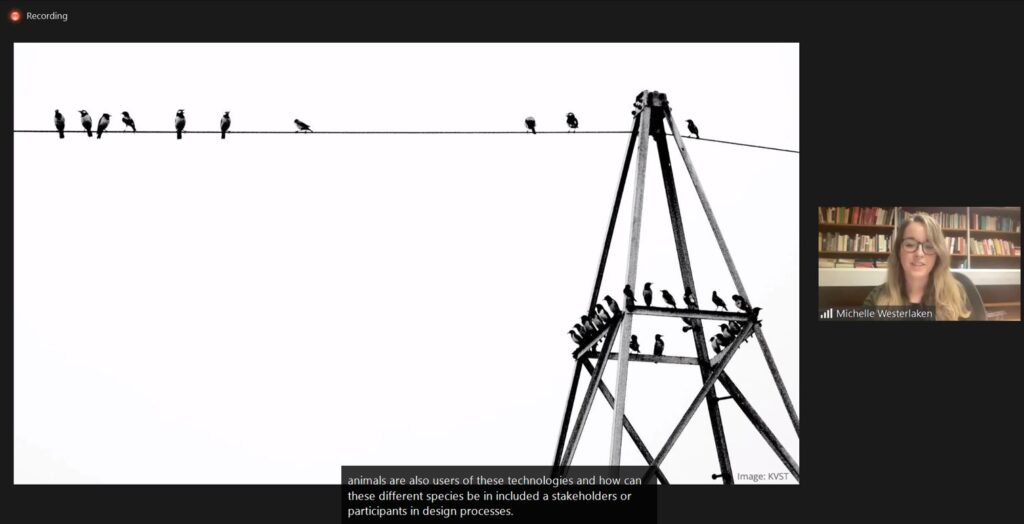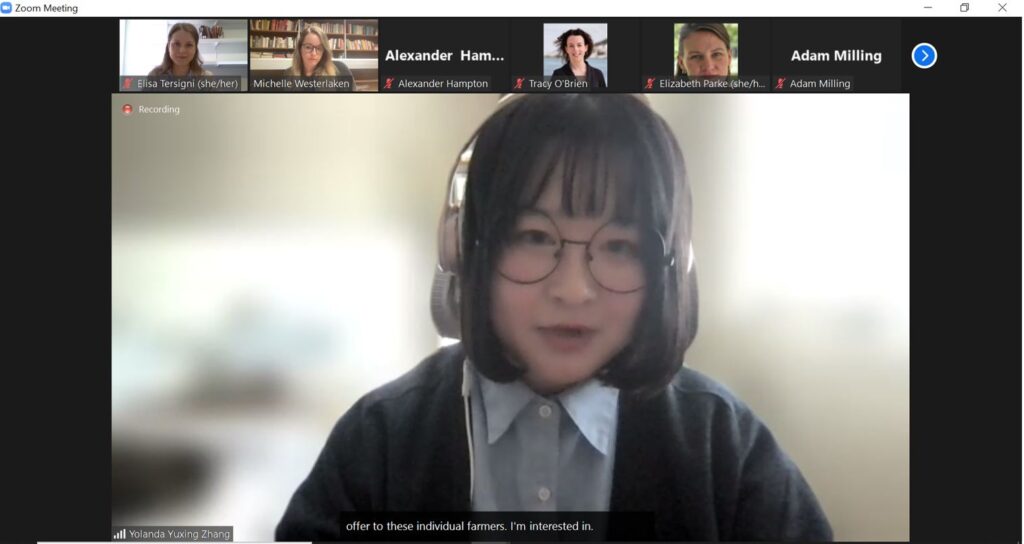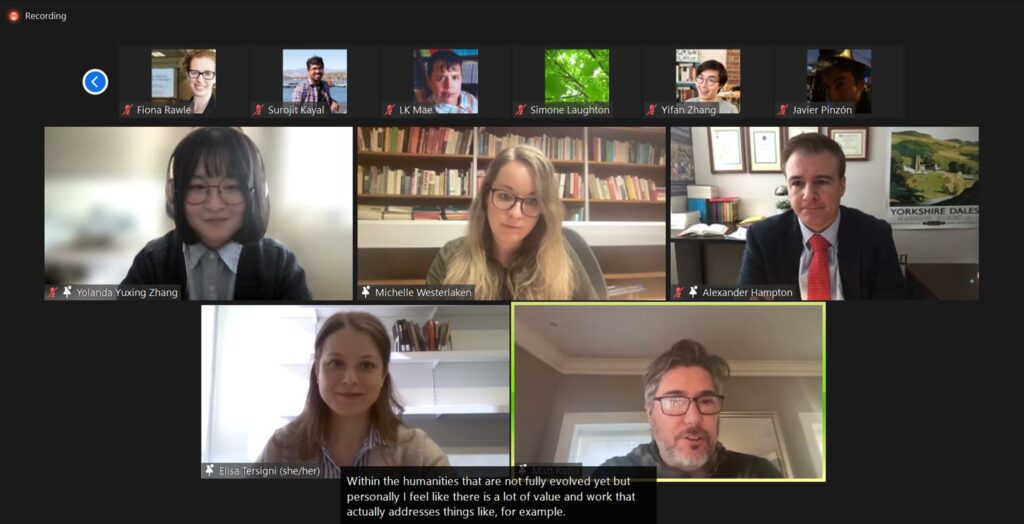By Tracy O’Brien
The fifth CDHI Lightning Lunch of the 2021–22 year took digital humanities research “beyond the human” to discuss how technology affects the non-human world and how the non-human world shapes technology. Rather than centering the human in these projects, the speakers shared work that acknowledges the interconnectedness of humans and non-humans and how that interconnectedness must be considered and respected as we aim to create sustainable technologies that will not threaten our survival. The range of subjects included urban bird song and habitat change during the pandemic; how non-human animals can and should participate in technology design; and the importance of more-than-human ethnography in precision agricultural practices.

Dr. Alexander JB Hampton (Assistant Professor, Department for the Study of Religion, University of Toronto) was the first speaker. His research lies at the intersection of religion, aesthetics, philosophy, and ecology and he spoke about a project for which he is the principal investigator, The Pleasure of the Dawn Chorus. Dr. Hampton made his subject immediately relevant by linking it to the ongoing pandemic, which has had the unanticipated effect of creating a growing awareness of urban wildlife through sound. He and his team have been recording the dawn chorus around the Greater Toronto Area in an effort to preserve the unique features of birdsong that have emerged as a result of reduced human activity in and around the city. A “dawn chorus” is the concert of sound that birds generate early in the morning, between dawn and sunrise and the characteristics of such concerts reveal a great deal of information about the health of the habitat in which they occur. The next steps of the project include transcribing spectrographic analyses of the dawn chorus recordings, translating them into musical compositions, and performing those compositions at a recital. Along with other forms of public engagement including lectures and videos, the project team invites people to submit their own dawn chorus recordings to the project via their website.

The second speaker was Dr. Michelle Westerlaken (Postdoctoral Researcher, Smart Forests, University of Cambridge), a designer who is interested in how nonhuman animals are affected when they have to interact with the technology that humans design and who is looking at ways to make technology ecologically sustainable. Dr. Westerlaken pointed out that, while the objective of design is to find solutions for technology users, one user’s solution is often another user’s problem—for example, technological solutions that reinforce inequalities or pollute the planet. She grounds her research and approach to design in Critical Animal Studies.
For her doctoral work, Dr. Westerlaken studied small scale interactions between humans and 10 animals, including dogs, penguins and worms among others, with the goal of making the animals part of the design process. She also described the postdoctoral work she is doing with Smart Forests, a project examining how “forests are becoming increasingly digital environments” because of the digital technologies that operate in and monitor such spaces. Smart Forests is interested not only in how technology shapes forests, but also how forests and species within them can shape technologies through interaction.

The final speaker was Yuxing (Yolanda) Zhang (PhD Candidate, Faculty of Information, University of Toronto and inaugural CDHI grad fellow) who shared her research on platformization of food production systems in China with a focus on peat farming and self-sustaining agricultural practices. She discussed her multispecies, or more-than-human, ethnographic approach, which “seeks to extend ethnographic work beyond the solely human realm by giving attention to the agency of plants, animals, microbes, or even viruses.” With respect to agriculture, food production companies use digital information to monitor the food trade and other metrics related to the agricultural business. Zhang is interested in the relationship between precision agricultural platforms and human/non-human relations. She noted the required human intervention in translating the circular nature of self-sustaining agricultural practices into metrics that food producers can use to inform their practices; in other words, people must observe and record what is happening in the more-than-human world to acquire information they can eventually use in algorithms. She also shared her views supporting the value of digital humanities work, which allows us to carry out work tying together science and humanities in a way that is ethical and sustainable in more-than-human worlds.

The Q&A opened with a conversation about the nature of collaboration when many of the participants are non-human. Here, Zhang described multispecies ethnography as part of “a critical response that illuminates and contests the anthropocentric frameworks in documenting and informing our culture and society [….] it actually builds on the realization that human exceptionalism has become the very ground for abrasive resource extraction and industrialization, colonialism, or planetary scale environmental crises and more than human ethnography works from the premise that the human is entangled, if not inseparable from what’s being called the environment.”
As an example, Zhang referenced farmers’ use of microbes to absorb waste in a step towards sustainable farming, but points out that in order for this to be successful, the farmers must become very attuned to the behaviour of these non-human organisms and how they are behaving in the farmers’ practice, which makes the microbes participants in the work rather than subjects.
Dr. Westerlaken added to Zhang’s remarks with her observations about how challenging it can be to have non-humans recognized as participants rather than subjects because this objective often conflicts with the priorities of many human stakeholders upon whom the researchers rely for access to resources for the research. She spoke of her personal experience working with zoo penguins where zoo management, public relations, zookeepers and others all had various levels of influence that her team had to consider with respect to the project.
At one point, Dr. Hampton was asked to comment on pleasure and its connection to nature, which he spoke of in terms of drawing oneself out to become a part of something larger and “to reconnect to the world beyond ourselves in a non-anthropocentric way.” He also identified the relationship between our connection to nature in terms of the pandemic, which he said has been caused by, among other things, “our failure to respect the space of nature, our failure to understand the virus sphere as part of nature, and our failure to understand forms of indigenous knowledge throughout all cultures which actually respected those boundaries between humans and nature.” He noted that he is fascinated by the dynamic between people’s fear of nature and the pleasure they derive from connection with it.
The conversation continued with an engaging discussion of anthropocentrism, the entanglements of technology and the environment, and the challenges of carrying out interdisciplinary work in an academia that still divides arts from sciences. The speakers’ presentations complemented each other exceptionally well and fostered a fascinating discussion about cutting-edge interdisciplinary research with a focus on ethical considerations when working directly or indirectly with non-human animals and the environment at large.
A recording of the Lightning Lunch is available on YouTube. To join the discussion on Twitter, please use the hashtag #CDHITalks and follow @UofTDHN. For information on upcoming workshops and other events, please visit CDHI Events.
Tracy O’Brien is a PhD Candidate in the Department of English and the collaborative Book History & Print Culture program and an inaugural CDHI fellow at the University of Toronto. Her doctoral research examines linguistic structures English women writers used in their compositions between the mid-16th and late-17th centuries.
